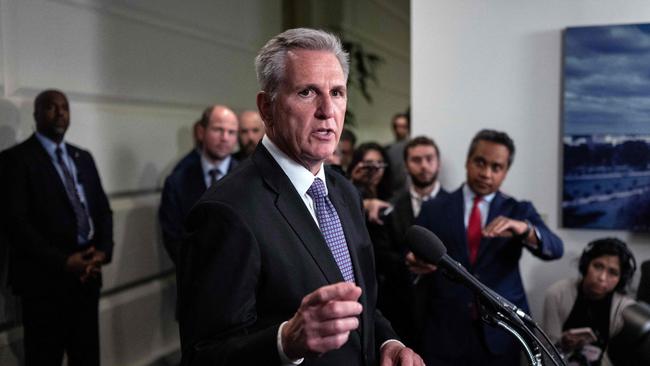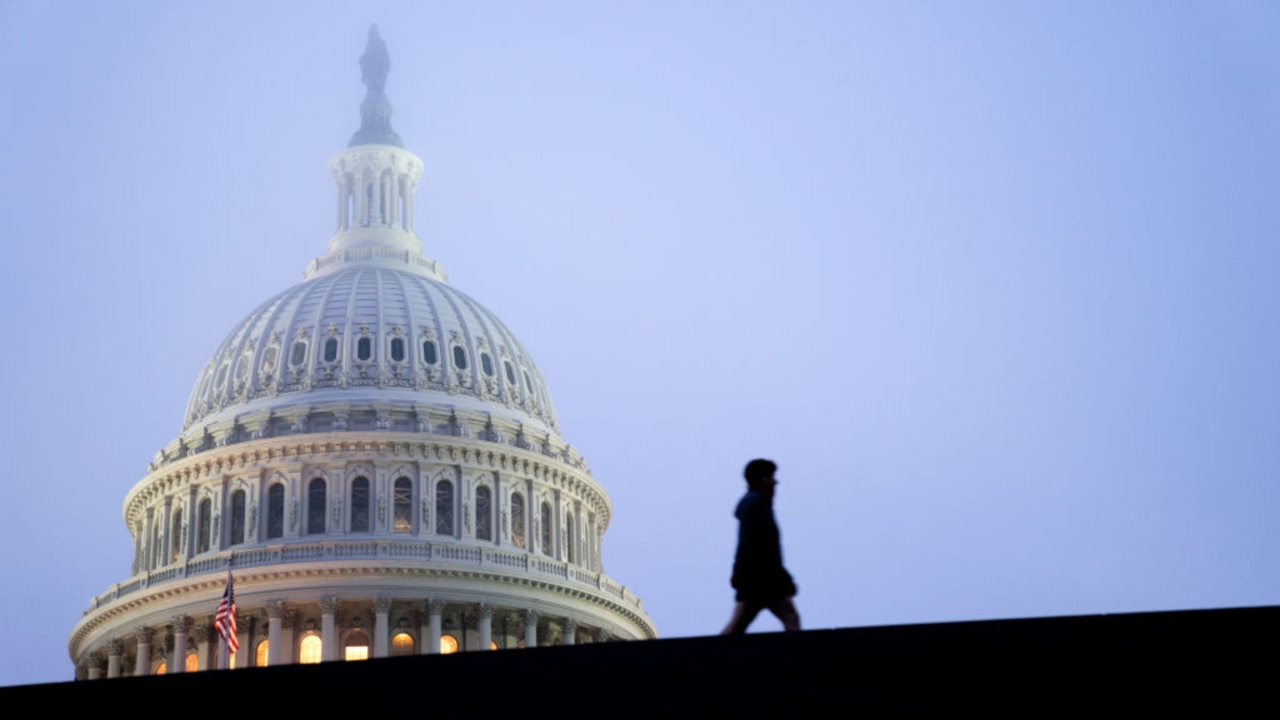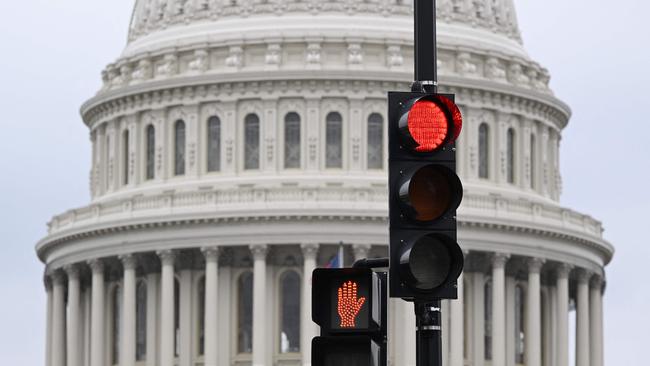Once gadflies, now giants: how polarisation sent Washington hurtling into a shutdown
Republican Party rebels, fuelled by social media and online fundraising, feel empowered to block their leaders from cutting budget deals with Democrats.

The small group of Republicans bucking their party leaders in the US House of Representatives and pushing the government toward a shutdown from Sunday would have carried a dismissive label in past years. They would be called gadflies – annoying to colleagues, and easily swatted away.
Today, the gadflies are giants of the political scene.
They are the members using inflammatory rhetoric and disruptive tactics to draw media attention and campaign donations from the most partisan voters – giving them power to oppose their own party leaders and a majority of their House GOP colleagues.
In doing so, they have become heroes to many in the Republican Party but symbols of what many voters say they lament: the drastic polarisation of politics, where the most combative politicians can command status while centrists struggle to be heard.
They are also helping to ensure a government shutdown happens at 12:01am on Sunday (3.01pm AEDT), as several of the House’s most stubborn rebels joined forces to defeat Republican Speaker Kevin McCarthy’s attempt on Friday US time to keep the government open for another 30 days. The measure’s failure left no clear path for the House to pass its own short-term spending bill, much less reach agreement with President Joe Biden and the Democratic-controlled Senate.
The defectors on that and other recent votes are using social media and online fundraising to build national profiles and liberate themselves from party leaders. One member of the bloc pushing for a shutdown, Rep. Marjorie Taylor Greene of Georgia, scooped up more campaign cash than nearly every other House member in 2022, partly on incendiary comments that rile up her party.

Florida RepresentativeMatt Gaetz, another leading antagonist of House leaders — particularly McCarthy — is a star in conservative media, with 2.5 million followers on the X social-media platform, formerly known as Twitter. If Representative Matt Rosendale of Montana runs for the US Senate, as expected, his calling card will be the pain, rather than the aid, he has given his party in Washington.
Every government shutdown – there have been 10 since 1977 lasting more than three days – ends with a political compromise. But these House members, part of a loose group of about 20 pushing Mr McCarthy to demand deep spending cuts and conservative policy riders, raise the prospect of a prolonged suspension of government services. They have blocked budget legislation favoured by hundreds of their House GOP colleagues and shown no inclination to make even basic bipartisan compromises.
“I’m doing everything in my power to stop the uniparty … the battle is on,” Mr Gaetz said Friday on the X platform.
Mr Gaetz and some other rebels say they are simply fighting for fiscal responsibility and the importance of considering annual spending bills one by one, rather than in massive year-end packages crafted behind closed doors.

But some GOP colleagues question their motives. “I’m always a little sceptical of people who think their vote is motivated by principle but the other side can’t possibly be,” said Representative Dusty Johnson of South Dakota, who chairs the centrist-leaning Republican Main Street Caucus. “That seems to me to be a level of narcissism that stands in the way of governance.”
The problem for GOP leaders: their control of campaign funds and committee assignments doesn’t carry the power it once did to force dissidents to toe the party line, allowing wayward members to essentially commandeer a House that Republicans control by only a handful of seats.
At the same time, a populist trend in both parties – and most notably in the GOP under former president Donald Trump — now rewards politicians who are most eager to knock down political institutions, even those led by their own party. Mr Trump himself has urged politicians to shut the government unless all conservative demands are met.
Gerrymandering by both parties has ensured that only a handful of members ever face a competitive election, prompting politicians to cater to the most ideological voters in their party, who tend to vote in primaries, rather than the political centre.
Of the 21 Republicans who opposed Mr McCarthy’s last-minute effort to pass a short-term funding bill, only one – Representative Lauren Boebert of Colorado – had a close election last year, winning by less than one-half of 1 per cent of the vote. Only one other defector, Representative Eli Crane of Arizona, won with less than a 10-point margin.
It is a party that many of the old-time conservatives don’t recognise. “The basic style of the populists is division, grievance, fighting. They constantly brag that they’re going to break things up or come to Washington with a blowtorch,” said former senator John Danforth, who represented Missouri for three terms, ending in 1995.
“The essence of conservatism is the opposite,” he said. “It’s holding things together. To insist on ‘my way or the highway’ and make non-negotiable demands – to me that’s just the opposite of conservatism and the opposite of the genius of the framers of the Constitution.”

Bruce Mehlman, a former Republican aide in Congress and official in former president George W. Bush’s administration, said social media had undermined the old power structure in congress. “In the old days, you needed the party to raise money, build a profile and grow power. The system rewarded team play,” he said. “Now, you can raise more running against the party and quickly build a national following as a populist disrupter of the establishment.”
The same forces have propelled some Democrats to prominence almost as quickly as they have arrived in Washington. At age 28, for example, Representative Alexandria Ocasio Cortez of New York became a social media sensation and favourite of her party’s liberal wing upon unseating a prominent centrist in the 2018 Democratic primary. However, then-speaker Nancy Pelosi had more success in corralling her party’s progressives and passing priority legislation than has Mr McCarthy so far, even while Democrats had a similarly narrow margin in Mr Biden’s first two years as president.
These factors heighten the problems that McCarthy is facing because of his slim, 221-212 margin, which means he can lose no more than four of his GOP colleagues unless he wants to pass bills with Democratic support — which would likely prompt conservatives to try to end his speakership. It is the fifth-narrowest margin in history, Pew Research Centre calculations find.
But the narrow margin doesn’t tell the full story of why the government is poised for a shutdown. In 2001, the Senate was evenly divided, 50-50, before a party switch gave Democrats a slim, two-seat majority. Yet that Senate passed a big tax cut that was a major Bush administration priority, as well as a landmark education overhaul called No Child Left Behind and the McCain-Feingold campaign-finance restrictions.
The difference: 30 senators at the time belonged to a party that didn’t match their state’s vote in the most recent presidential election, meaning those senators weren’t free to cater only to their party’s core voters. Today, by contrast, only five senators and 23 of the 435 House members face similar cross-pressures.
“The margins are thinner,” said Representative Steve Womack (Republican, Arkansas), a longtime member of the House appropriations committee. “And the number of people who – I call them free agents – the number of people in our conference who kind of go their own way is higher. They dance to their own beat.”
And Mr Trump adds complications by cheering on the rebellion. “It kind of promotes that free agency,” Mr Womack said.
Recent election trends show how the incentives in Washington have changed, with politicians rewarded for ensuring a secure bond with their party’s core voters.
Lawmakers are less reliant on political parties for money. Ms Greene, for example, was the ninth-largest fundraiser in the 2022 election cycle among current House members, and 98 per cent of her money came from individual donors rather than party, corporate or political-action committee sources, data from the nonpartisan group Open Secrets shows. Ms Ocasio-Cortez ranked 10th, and essentially all of her money came from individual donors.
Fewer politicians have incentives to appeal to constituents of both parties. The 23 House members representing districts that favoured the opposite party for president – five Democrats in Trump-backing districts and 18 Republicans in Biden districts – are one of the smallest such groups in recent decades, data from the University of Virginia Centre for Politics show.
In 2000, 86 districts picked a House member from one party and a presidential candidate from the other party. In 1984, there were 190 such districts.

Some of the House rebels may be charting a path to higher office, and a reputation for combativeness and challenging institutions could be helpful in a base-driven Republican primary. Mr Rosendale, for example, would be running for the Senate from the political right against a candidate favoured by the state’s Republican governor and prominent GOP senators. Mr Gaetz is considering a bid for Florida governor, in which he could face Representative Byron Donalds, who unlike Mr Gaetz not only voted for the short-term funding measure on Friday but also was the lead sponsor.
These and a wider group of Mr McCarthy antagonists have made life hard for the speaker in recent weeks as politicians worked – unsuccessfully – to pass stopgap government funding and forestall a shutdown.
One sign of Mr McCarthy’s difficulty came in procedural votes that draw little attention beyond congress but are essential to its operations. Three times this year, the House voted to reject the rules that set terms for debating a piece of legislation and normally attract near-unanimous majority party support. They were the first such rules defeated in 20 years, according to experts on Congress.
Mr McCarthy has taken significant steps to please the rebellious wing, such as announcing the start of a formal Biden impeachment inquiry – a step that makes some swing-district Republicans wary.

It remains unclear how Mr McCarthy might strike such a government-funding deal without prompting his defecting colleagues to call a vote to rescind his speakership.
Representative Ralph Norman of South Carolina opposed Mr McCarthy on a recent procedural vote on spending bills, though on Friday he backed the short-term spending bill. Still, he isn’t giving the Speaker much room to break from conservative policy positions as the inevitable negotiations begin with the Senate.
Mr Norman said earlier this week that he would likely vote to strip Mr McCarthy of the Speaker’s gavel if he wound up “teaming up with Democrats”.
He said he wasn’t concerned about Republican politicians like himself being blamed for a shutdown. “I’m not worried about optics, I’m worried about reality,” he said. “The reality is, our border’s unacceptable – it’s an invasion. We’re going bankrupt. That’s reality.”
His constituents, he said, “know we’re doing it for the good of the country.”
Siobhan Hughes contributed to this article.
The Wall Street Journal






To join the conversation, please log in. Don't have an account? Register
Join the conversation, you are commenting as Logout